Home Tags Posts tagged with "barack obama"
barack obama
Republicans in the House of Representatives have met President Barack Obama amid renewed efforts to avert a looming debt crisis.
Both sides described the 90-minute meeting as useful but said no decision was made. They agreed to keep talking.
Republicans have offered the president a short-term debt limit increase to stave off default.
A new poll suggests the majority of Americans blame the Republicans for the partial shutdown of government.
A Wall Street Journal/NBC News poll suggests 53% of Americans blame the Republicans for the crisis, compared with 31% who say the Democrats are responsible.
“It was a very adult conversation,” said Republican Hal Rogers of the meeting.
“Both sides said they were there in good faith.”
House Majority leader Eric Cantor called the meeting “very useful” and said the talks were continuing.
The White House said in a statement: “The president looks forward to making continued progress with members on both sides of the aisle.”
Officials have warned the US risks default on October 17 if the nation’s borrowing limit is not increased.
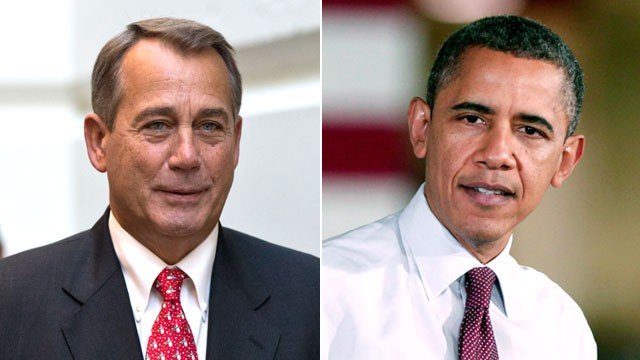
Republicans in the House of Representatives have met President Barack Obama amid renewed efforts to avert a looming debt crisis
Republicans have offered to extend the government’s borrowing authority beyond the deadline, temporarily putting off a default.
In return they want Barack Obama to further negotiate on the budget dispute that has partially closed the government – the first shutdown for 17 years.
It is not clear if Republicans are willing to drop entirely their attempts to defund or delay Barack Obama’s 2010 healthcare law.
Leading Republican Pete Sessions said the two sides were working on “defining parameters to see if we can make progress”.
Earlier, House of Representatives Speaker John Boehner said Republicans had told Barack Obama they wanted “a temporary increase in the debt ceiling” followed by talks on “a way forward to reopen the government.”
“It’s time for leadership,” the Ohio Republican said.
“It’s time for these negotiations and this conversation to begin.”
A spokesman for John Boehner told reporters the deal offered was a “clean” increase of the debt limit, with no additional policies attached.
It would only last six weeks – until November 22.
Reacting to the offer, White House press secretary Jay Carney told a daily press briefing the president was glad that “cooler heads” seemed to be prevailing in the House.
But he added: “He will not pay ransom in exchange for the Republicans in the House doing their job.”
Earlier on Thursday, Democratic Senate leader Harry Reid said the Senate would “look at anything” the House sent to them, but they would not engage in negotiations with Republicans prior to reopening the government.
The impasse over the debt limit has already rattled markets and increased the interest rate for one-month US Treasury bills. But US stock markets rebounded on Thursday on news of a possible breakthrough.
Democratic Senate finance committee chairman Max Baucus said the Republican campaign to undermine the healthcare law in return for agreeing to end the shutdown was “not up for debate” and would not happen.
Hundreds of thousands of federal employees have been out of work since the shutdown began, and private firms, from arms makers to motels, have begun to lay off workers.
About 15,000 private-sector employees have filed for unemployment benefits due to the shutdown, the US labor department said on Thursday.
And governors in at least four western states – Utah, South Dakota, Arizona and Colorado – have asked for authority to reopen national parks within their borders because of the economic impact of the closures.
On Thursday, Barack Obama signed legislation restoring death benefits to families of US troops who have died since the government closed. The shutdown prevented processing of the payments, typically made within days of the soldier’s death.
The president also met House Democrats at the White House on Wednesday and told them he would prefer a longer-term increase to the nation’s $16.69 trillion debt ceiling.
But the president said he was willing to accept a short-term rise in the borrowing cap to “give Boehner some time to deal with the Tea Party wing of his party”, Representative Peter Welch told the Associated Press news agency after the meeting, referring to a Republican faction of hard-core conservatives.
Earlier, Treasury Secretary Jack Lew told a congressional panel that skipping a payment on US debt would trigger a potentially profound financial crisis.
“It would be chaos,” Jack Lew told the Senate hearing.
Since the US hit its debt ceiling in May, the treasury has been using what are called extraordinary measures to keep paying the bills, but those methods will be exhausted by October 17, Jack Lew has said.
[youtube wpm3bRPP-Ok]
President Barack Obama has announced he is willing to hold budget talks with Republicans, but not until they agree to lift “threats” against the economy.
Republicans “don’t get to demand ransom in exchange for doing their jobs”, Barack Obama said, by demanding concessions in policy before reopening government.
The US government shut down last week when Congress failed to agree a budget.
Republican leaders on Tuesday renewed their calls for Barack Obama to open negotiations over ending the impasses.
Republican House Speaker John Boehner told reporters he was “disappointed that the president refuses to negotiate”.
He said the president’s position not to talk with Republicans “until [they] surrender” was not sustainable, and any discussions regarding the debt ceiling must address how the nation is “living beyond its means”.
At the White House, Barack Obama said he had spoken to John Boehner and was “happy to talk with him and other Republicans about anything”.
But Barack Obama said any negotiations on the ongoing government shutdown or the debt limit “shouldn’t require hanging the threats of a shutdown or economic chaos over the heads of the American people”.

Barack Obama has announced he is willing to hold budget talks with Republicans, but not until they agree to lift “threats” against the economy
“We can’t make extortion routine as part of our democracy,” Barack Obama said.
“Democracy doesn’t function this way. And this is not just for me. It’s also for my successors in office, whatever party they’re from.”
He also warned of the repercussions of defaulting on the government’s debt should Congress fail to raise the borrowing limit, currently set to be reached on October 17.
Barack Obama said breaching the borrowing limit could disrupt capital markets, undermine international confidence in America, permanently increase the nation’s borrowing costs, add to its deficits and debt, and pose the “significant risk of a very deep recession”.
The US government partially shut down operations on October 1st after Republicans who control the House of Representatives refused to approve a budget, saying they would only do so if Barack Obama’s healthcare reform law were delayed or stripped of funding.
Barack Obama and the Democrats have thus far refused, noting the law was passed in 2010, subsequently approved by the Supreme Court, and was a central issue in the 2012 election which Obama won.
At the same time, the Republicans have refused to approve an increase in the US debt limit unless it is accompanied by significant spending cuts and other policy concessions.
Barack Obama maintains John Boehner could end the current government showdown by allowing the House to vote on a “clean” budget bill that does not alter the health law, because that could pass with votes from both Democrats and moderate Republicans.
But doing so would risk damaging his standing with the most conservative elements of his caucus, analysts say.
US and foreign officials and economists have warned of severe economic consequences if the US defaults on its debt because the government is unable to borrow money to fund its obligations.
[youtube W88GSw0hr8k]
Business is starting to suffer from the US shutdown, Commerce Secretary Penny Pritzker has warned.
Penny Pritzker’s comments at the Asia-Pacific Economic Cooperation (APEC) came as leaders gathering for the summit voiced worries about the US situation.
Philippine President Benigno Aquino said that what happens in the US “affects us all”.
On Friday, the US defense contractor Lockheed Martin said it would put 3,000 workers on unpaid leave.
The US government closed non-essential operations on Tuesday after Congress failed to agree a new budget.
President Barack Obama cancelled a scheduled trip to Asia because of the shutdown.
“The shutdown is not good for business. It’s not good for the economy,” Penny Pritzker said.
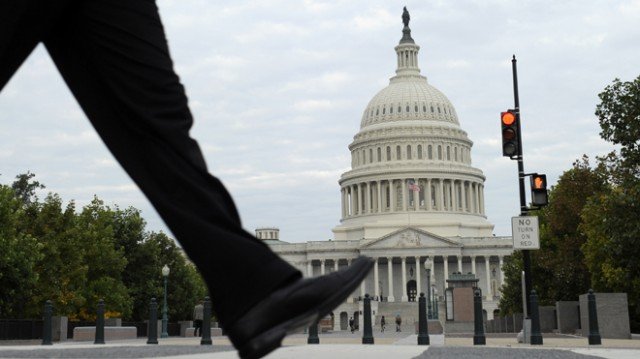
The US government closed non-essential operations on Tuesday after Congress failed to agree a new budget
One consequence of the shutdown had been her department’s inability to collate vital economic data.
“We’re a huge source of data for American business and that is a problem… It’s affecting businesses and it’s affecting their ability to get data,” she said.
From Monday, Lockheed Martin will put 3,000 staff on leave, but the defense giant said this number would rise if the shutdown continued.
“I’m disappointed that we must take these actions and we continue to encourage our lawmakers to come together to pass a funding bill that will end this shutdown,” Marillyn Hewson, Lockheed’s chief executive and president, said in a statement.
“We hope that Congress and the Administration are able to resolve this situation as soon as possible,” she added.
The announcement followed United Technologies’ decision to temporarily lay off 2,000 employees.
The company, which makes Blackhawk helicopters, said some manufacturing had been halted because there were no government inspectors working to sign off products.
The widening impact of the shutdown sparked concern at APEC meeting in Bali on Sunday.
Benigno Aquino said: “The US economy is the number one economy in the world, what happens there affects all of us.
“The world economy obviously is not in a position to withstand too much shock at this time when we are just recovering as a global economy.”
Meanwhile, Chilean President Sebastian Pinera said the US had to confront its fiscal problems “in a better way than they are doing it now with shutting down the government”.
Barack Obama is refusing to negotiate with the Republicans over the budget issues until they pass a temporary bill to reopen the government.
The president also wants agreement to raise the $16.7 trillion US borrowing limit, to avoid the country defaulting on its debts.
[youtube PusFD71IQ7k]
John Kerry has warned that any prolonged shutdown of the government could affect the US internationally.
Speaking at the APEC forum in Indonesia, the US Secretary of State said any impact was “momentary” and Washington’s commitment to Asia was “undiminished”.
President Barack Obama cancelled his Asia visit because of the shutdown.
The US government closed non-essential operations on Tuesday after Congress failed to agree a new budget.
Thousands of federal employees have been sent home. Some are working but not paid.
US-EU trade negotiations have also been postponed because of the crisis.
As world leaders headed for the Asia-Pacific Economic Co-operation (APEC) summit in Bali, John Kerry sought to allay concerns that Washington was reducing its global engagement.
“None of what is happening in Washington diminishes one iota our commitment to our partners in Asia,” he said.
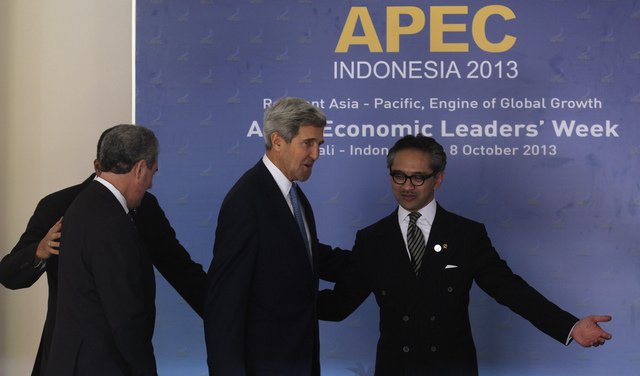
John Kerry has warned that any prolonged shutdown of the government could affect the US internationally
John Kerry said the dispute with the Republicans in the US Congress was “an example of the robustness of our democracy”.
But at the same time, he urged Congress to think about how the US was perceived internationally when “we can’t get our own act together”.
John Kerry said areas where the shutdown was affecting US foreign policy funding included:
- delays in security assistance for Israel
- nearly all staff suspended at the treasury department’s Office of Foreign Asset Control, which monitors sanctions on states like Iran
The Secretary of State warned of the consequences if the shutdown became longer term.
“This is a momentary impact. Obviously if it were prolonged or repeated people would begin, I think, to question the willingness of the United States to stay the course or its ability to, but that’s not the case and that will not be the case.”
Barack Obama had been due to begin a four-nation Asian trip on Saturday, heading to Bali and Brunei before travelling on to Malaysia and the Philippines.
The president used the APEC summit two years ago to announce a rebalancing of American naval power towards the Pacific.
The White House said Barack Obama’s decision to cancel his Asia trip was made due to the “difficulty in moving forward with foreign travel in the face of a shutdown”.
[youtube haX6l3_Xwl8]
US and EU negotiations on a sweeping free trade pact have been postponed because of a partial government shutdown in America.
US officials had been due in Brussels next week to discuss the deal aimed at boosting bilateral ties.
President Barack Obama earlier cancelled his trip to Asia because of the shutdown.
The US government closed non-essential operations on Tuesday after Congress failed to agree a new budget.

US and EU negotiations on a sweeping free trade pact have been postponed because of a partial government shutdown in America
Since then hundreds of thousands of government employees have not been working or paid.
On Friday, US trade representative Michael Froman informed the EU that financial and staffing constraints made it impossible to send a full negotiating team to Brussels.
But he stressed that Washington would continue working with the EU on drawing up the deal, but would have to wait until the shutdown was over.
Reacting to the US announcement, European Trade Commissioner Karel De Gucht said the delay was unfortunate.
“But let me underline that it in no way distracts us from our overall aim of achieving an ambitious trade and investment deal,” he added.
Meanwhile, the White House said that Barack Obama would miss two summits in Asia, including the Asia-Pacific Economic Co-operation (APEC) meeting in Indonesia.
It said the decision was made due to the “difficulty in moving forward with foreign travel in the face of a shutdown”.
The US government partially shut down operations on Tuesday after Republicans who control the House of Representatives refused to approve a budget, saying they would only do so if Barack Obama’s healthcare reform law was delayed or stripped of funding.
President Barack Obama has decided to cancel his trip to Asia because of the US government shutdown.
Barack Obama will miss two summits, including the Asia-Pacific Economic Co-operation (APEC) meeting in Indonesia.
The decision was made due to the “difficulty in moving forward with foreign travel in the face of a shutdown”, the White House said.
The US government closed non-essential operations after the two houses of Congress failed to agree a new budget.
Barack Obama called Indonesian President Susilo Bambang Yudhoyono on Friday morning and expressed his regret for the cancellation.
The visit has not been rescheduled.
Secretary of State John Kerry will attend the APEC gathering and the East Asia summit in Brunei in Barack Obama’s place, the White House said.
“The cancellation of this trip is another consequence of the House Republicans forcing a shutdown of the government,” the White House said in a statement.
“This completely avoidable shutdown is setting back our ability to create jobs through promotion of US exports and advance US leadership and interests in the largest emerging region in the world,” the statement added.
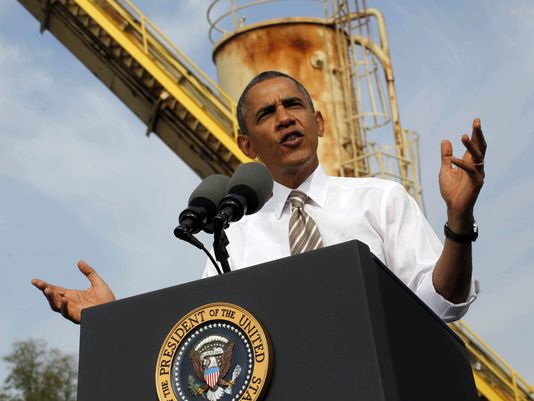
President Barack Obama has decided to cancel his trip to Asia because of the US government shutdown
Barack Obama had been due to begin a four-nation Asian trip on Saturday, heading to Bali and Brunei for regional summits before travelling on to Malaysia and the Philippines.
On Wednesday, the White House had said Barack Obama would postpone his trips to Malaysia and the Philippines because of the US government shutdown, but maintained that he would travel to Indonesia and Brunei.
The US government began a partial shutdown earlier this week after Republicans refused to approve a budget, saying they would only do so if funding for President Barack Obama’s healthcare reforms was delayed.
On Friday, Democrats and Republicans appeared no closer to resolving the feud.
The US also faces running out of money and defaulting on its debt if there is no agreement to raise government borrowing limits later this month.
Christine Lagarde, managing director of the International Monetary Fund (IMF), said on Thursday that a failure to raise the US debt ceiling would be a far worse threat to the global economy than the current shutdown.
She said it was “mission critical” that the US agrees a new debt limit.
Christine Lagarde’s comments were echoed by the US Treasury.
It said a debt default could lead to a financial crisis as bad as 2008 or worse.
Meanwhile, the impact of the shutdown was being felt across the country.
The National Transportation Safety Board did not send investigators to a deadly church bus crash in Tennessee that killed eight people and injured 14 others.
The Labor Department also said it wouldn’t release the highly anticipated September jobs report on Friday because the government remains shuttered.
With Tropical Storm Karen bearing down on the Gulf States, the website of the National Oceanic and Atmospheric Administration (NOAA), carried a message saying: “Due to the Federal government shutdown, NOAA.gov and most associated web sites are unavailable.”
It referred visitors to the National Weather Service.
However, the Federal Emergency Management Agency (FEMA) recalled workers to help prepare for the storm.
[youtube 51XY45c1c1c]
President Barack Obama has warned that Wall Street should be concerned that a conservative faction of Republicans is willing to allow the country to default on its debt.
The US government has begun a partial shutdown after Congress failed to agree a budget and will run out of cash on October 17 unless its debt ceiling is raised.
In a TV interview on Wednesday, Barack Obama said he was “exasperated”.
The president later held talks with Congressional leaders that ended without agreement.
The US government closed non-essential operations on Tuesday after Congress failed to strike a deal on a new budget.
Republicans and Democrats are blaming each other for the impasse.
The shutdown has left more than 700,000 employees on unpaid leave and closed national parks, tourist sites, government websites, office buildings, and more.
However, as one budget crisis raged in Washington DC, another one – potentially more dangerous – loomed in the coming weeks.
On October 17, the US government will run out of cash to pay its bills unless the debt ceiling is raised.
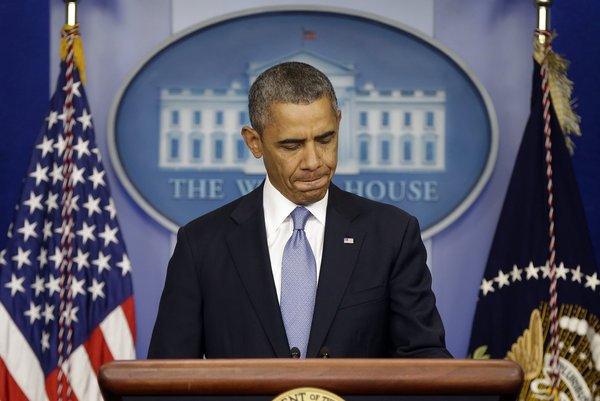
President Barack Obama has warned that Wall Street should be concerned that a conservative faction of Republicans is willing to allow the country to default on its debt
On both issues, the Republicans who control the House of Representatives have demanded concessions from Barack Obama and his fellow Democrats in return for funding the government’s continued operation and for raising the debt ceiling.
Chiefly, the Republicans demand the repeal, delay or defunding of a healthcare reform law – dubbed Obamacare – passed by the Democrats in 2010.
Major portions of that law, which was subsequently validated by the US Supreme Court and was a major issue in the 2012 presidential election, took effect on Tuesday.
On Wednesday, Barack Obama met the heads of some of Wall Street’s biggest banks – including JPMorgan Chase, Goldman Sachs and Bank of America – to discuss the debt ceiling and other economic issues.
The bankers are members of the Financial Services Forum, a lobby group which has, along with 250 other businesses, sent a letter to Congress urging it to raise the debt limit.
Following the meeting, Barack Obama told CNBC “it’s important for them to recognize that this is going to have a profound impact on our economy and their bottom lines”.
Barack Obama also said he was unwilling to negotiate “with the extremist wing of one party” as the October 17 deadline neared.
“The message I have for the [Congressional] leaders is, as soon as we get a clean piece of legislation that reopens the government… until we get that done, until we make sure that Congress allows [the Department of the Treasury] to pay for things that Congress itself already authorized, we are not going to engage in a series of negotiations,” he said.
As foreign markets anxiously monitored the US budget crisis, European Central Bank chief Mario Draghi warned that a protracted shutdown was “a risk not only for the US, but also the world economy”.
On Wednesday evening Barack Obama met Republican House Speaker John Boehner, as well as Senate Republican leader Mitch McConnell, Democratic Senate Majority Leader Harry Reid and House Minority Leader Nancy Pelosi at the White House.
John Boehner later left the talks complaining that the Democrats would not negotiate.
“All we’re asking for here is a discussion and fairness for the American people under Obamacare,” he told reporters.
Nancy Pelosi, however, accused the Republicans of “moving the goalposts” on the budget deal.
Harry Reid said Democrats were “locked in tight on Obamacare” and neither the president nor Democrats in Congress would accept changes to the law as the price for a deal on reopening the government.
Analysts say John Boehner could end the current government showdown by allowing the House to vote on a “clean” budget bill that does not alter the health law, because that could pass with a coalition of Democrats and moderate Republicans.
But doing so would risk his standing with the most conservative elements of his caucus.
Earlier on Wednesday, senior US intelligence officials warned the shutdown of the government seriously damaged the ability of spy agencies to protect the US.
Director of National Intelligence James Clapper told a Senate panel that an estimated 70% of intelligence workers had been placed on unpaid leave.
Also on Wednesday, the White House announced Barack Obama would cut short a planned four-nation tour of Asia next week.
The president will attend regional summits in Indonesia and Brunei, but skip Malaysia and the Philippines due to the government shutdown.
The US government ceased operations deemed non-essential at midnight on Tuesday, when the previous budget expired.
[youtube f8lIuin01GE]
The White House has announced President Barack Obama would not now visit Malaysia and the Philippines because of the government shutdown but would still travel to Indonesia and Brunei on his four-nation Asian tour.
Malaysia had already announced Barack Obama would be replaced by Secretary of State John Kerry for the visit next week.
The US government has partially shut down after the two houses of Congress failed to agree a new budget.
More than 700,000 federal employees face unpaid leave, and national parks, museums and many buildings are closed.
Barack Obama earlier vowed not to allow Republicans to undermine his signature healthcare legislation as a condition to restart the US government.
“They demanded ransom,” Barack Obama said.
Barack Obama had been scheduled to begin his four-nation Asian trip on Saturday to boost economic ties.
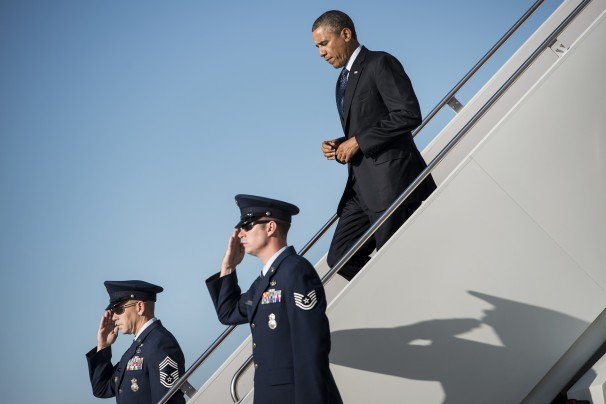
President Barack Obama would not now visit Malaysia and the Philippines because of the government shutdown
Earlier, the office of Malaysian Prime Minister Najib Razak said Barack Obama had called him on Wednesday to inform him that Mr Kerry would address an entrepreneurship conference in Kuala Lumpur on October 11 in his place.
Barack Obama has been forced to call off trips to Asia before.
In 2010, a vote on health care and the Gulf of Mexico oil spill forced separate cancellations in March and June, though he did make it to India, South Korea, Japan and Indonesia in November of that year.
The US government ceased operations deemed non-essential at midnight on Tuesday, when the previous budget expired.
National parks and Washington’s Smithsonian museums are closed, pension and veterans’ benefit cheques will be delayed, and visa and passport applications will go unprocessed.
However, members of the military will be paid.
One group of elderly military veterans managed to bypass the shutdown when the WWII Memorial in Washington DC – that they had travelled from Mississippi to see – was opened for them.
President Barack Obama has blamed conservative Republicans in the House of Representatives for the government shutdown, saying “one faction of one party” was responsible because “they didn’t like one law”.
“They’ve shut down the government over an ideological crusade to deny affordable health insurance to millions of Americans,” the president said.
The White House rejected a Republican plan to fund only a few portions of the government – national parks, veterans’ programmes and the budget of the District of Columbia.
The Republicans have called for more negotiations.
[youtube -UwVGXmOUcQ]
As the US Congress has failed to agree a budget by October 1st and a federal government shutdown has begun, more than 700,000 federal workers will be sent home and national parks, museums, federal buildings and services closed down.
How will key departments be affected by the government shutdown?
Department of Defense
The nation’s 1.4 million active-duty uniformed military personnel will stay on duty.
About half of the defense department’s 800,000 civilian employees will have to stop work, but there is a blanket exception for activities that “provide for the national security”.
But where employees are needed to work, they may have to do so without pay:
“Military and other civilians directed to work would be paid retroactively once the lapse of appropriation ends,” according to Defense Department Comptroller Robert Hale.
Department of Energy
Most Department of Energy facilities will close, with only 1,113 out of 13,814 required to work.
Exemptions include staff overseeing the safety of the nation’s nuclear arsenal and operating dams and power lines across the country.
The National Nuclear Security Administration, which oversees the nation’s nuclear weapons and naval reactor programmes, will have 343 employees on duty to “perform functions related to the safety of human life and the protection of property”.
More than 400 employees will stay on to work at the Southwestern Power Administration and the Western Area Power Administration, which are in charge of overseeing hydroelectric power and power lines in the south and western US.
Some staff in other areas will remain at work to oversee “the protection of human life and property”.
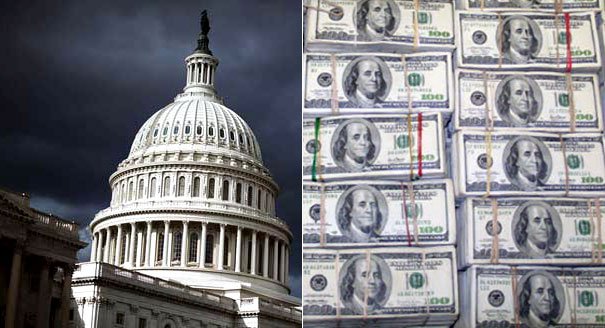
A federal government shutdown has begun as the US Congress has failed to agree a budget by October 1st
Department of Transportation
Transport roles ranging from air traffic control to airport and hazardous materials inspections will continue and 36,987 out of 55,468 personnel will remain at work.
Staff involved in overseeing commercial space launches would also continue operations – as at least one of a succession of launches will occur between the end of September and the first week in October in support of the International Space Station, according to the department.
Suspended activities will include facility security inspections, routine personnel security background investigations and the employee drug testing program.
Smithsonian Institution
The National Zoo and 19 museums and galleries, including the Natural History Museum, the Portrait Gallery and the Air and Space Museum, would close.
Of the 4,202 employees, 688 will be retained to “protect life and property” – security guards, maintenance staff and people to care for and feed the animals at the National Zoo.
The Smithsonian Institution says: “During a shutdown, the Institution cannot legally accept voluntary services from federal employees to continue their regular duties.”
National Parks
National parks – from Yosemite to Alcatraz and the Statue of Liberty – will be shut down with 3,266 essential staff out of 24,645 remaining on duty. These will include some fire management, law enforcement and emergency responders.
Day-use visitors will be instructed to leave the park immediately and visitors using overnight facilities will be asked to make alternative arrangements and leave.
Where possible, park roads will be closed and access denied.
Department of Homeland Security
About 86% of the Department of Homeland Security’s 240,000 employees are expected to be exempt from the shutdown, including uniformed agents and officers at the country’s borders and ports of entry.
Most members of the Coast Guard, Transportation Security Administration, Secret Service and other law enforcement agencies are exempt.
US Citizenship and Immigration Services employees will continue to process green card applications.
Department of Justice
Of 114,486 Department of Justice employees, an estimated 96,744 will be exempt from the shutdown.
All Federal Bureau of Investigation (FBI) agents and support personnel in the field will be exempt as their operations are focused on national security and investigations involving protection of life and property.
Drug Enforcement Administration agents working on active counternarcotics investigations, agents in the Bureau of Alcohol, Tobacco, Firearms and Explosives, and US attorneys will be exempt.
Staff at federal prisons will also be expected to work
US Postal Service
The self-funded US Postal Service will remain open and deliver as usual. The agency receives no tax dollars for day-to-day operations and relies on income from stamps and other postal fees to keep running.
[youtube KI89iucv5mg]
The US government begins a partial shutdown after the Republican-led House of Representatives refused to approve a budget for next year.
A midnight deadline passed without agreement despite a last-gasp appeal by President Barack Obama.
More than 700,000 US government workers face unpaid leave with no guarantee of back pay once the deadlock is over.
Republicans have insisted on delaying President Barack Obama’s health care reforms as a condition for passing the budget.
It is the US government’s first partial shutdown in 17 years.
With less than one hour to go before midnight, the Republican-led House called for a conference – a bipartisan committee with the Senate to try to thrash out a deal – but Democrats said it was too late to avoid a shutdown.
The White House’s budget office began notifying federal agencies to begin an “orderly shutdown” as midnight approached.
One of the first casualties of the shutdown was the Twitter account for the US Capitol.
“Due to a lapse in government funding, this account will not be active until further notice,” it posted.
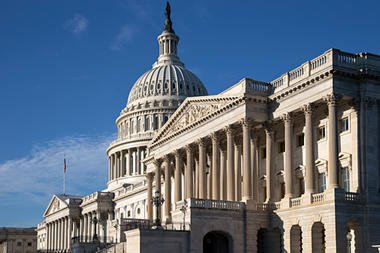
The US government begins a partial shutdown after the Republican-led House of Representatives refused to approve a budget for next year
Earlier it had warned that the Capitol’s visitors’ centre would be closed if the shutdown went ahead, and all tours would be suspended.
Shortly after midnight, President Barack Obama tweeted: “They actually did it. A group of Republicans in the House just forced a government shutdown over Obamacare instead of passing a real budget.”
House Speaker John Boehner told reporters he hoped the Senate would accept an offer of conference with the House “so we can resolve this for the American people”.
“The House has voted to keep the government open but we also want basic fairness for all Americans under Obamacare,” he said.
The Senate is to meet again at 09:30 on Tuesday, Democratic Senate Majority Leader Harry Reid said.
On Monday afternoon, the Democratic-led Senate voted 54-46 against a bill from House Republicans that would have funded the government only if President Barack Obama’s healthcare law – dubbed Obamacare – was delayed for a year.
The US stock market dropped amid fears of political deadlock, although analysts say serious damage to the economy is unlikely unless the shutdown lasts for more than a few days.
Early on Monday evening, Barack Obama went on national television to criticize Republicans for trying to refight the last election.
A shutdown would have “a very real economic impact on real people, right away,” he said, adding it would “throw a wrench” into the US recovery.
“The idea of putting the American people’s hard-earned progress at risk is the height of irresponsibility, and it doesn’t have to happen.”
After the Senate vote, the chamber’s Democratic majority leader blamed Republicans for the imminent halt to all non-essential government operations.
“It will be a Republican government shutdown, pure and simple,” said Harry Reid, referring to the Republicans as “bullies”.
The House then passed another bill on Monday evening to fund the government – but with a one-year delay to one of the health law’s primary elements not due to begin on October 1, the individual mandate.
The Senate again rejected the Obamacare provisions with less than three hours before the deadline.
Major portions of the healthcare law, which passed in 2010 and has been validated by the US Supreme Court, are due to take effect on Tuesday regardless of whether there is a shutdown.
Under the shutdown, national parks and Washington’s Smithsonian museums will close, pension and veterans’ benefit cheques will be delayed, and visa and passport applications will go unprocessed.
Programmes deemed essential, such as air traffic control and food inspections, will continue.
[youtube KI89iucv5mg]
The US government shutdown is looming as Democrat and Republican lawmakers remain unable to strike a deal on a new plan to continue funding its operation.
If they fail to reach an agreement by midnight, the US government will be forced to close all non-essential federal services.
More than 800,000 staff could be sent home on unpaid leave, with no guarantee of back pay once the deadlock is over.
The shutdown would be the first in the US for 17 years.
One of the key points of contention in the political stalemate has been President Barack Obama’s healthcare law, popularly known as Obamacare.
Republicans in the House of Representatives – and their allies in the Senate – have demanded the law be repealed or stripped of funding as a condition for continuing to fund the government.
Major portions of the law, which passed in 2010 and has been validated by the US Supreme Court, are due to take effect on Tuesday.
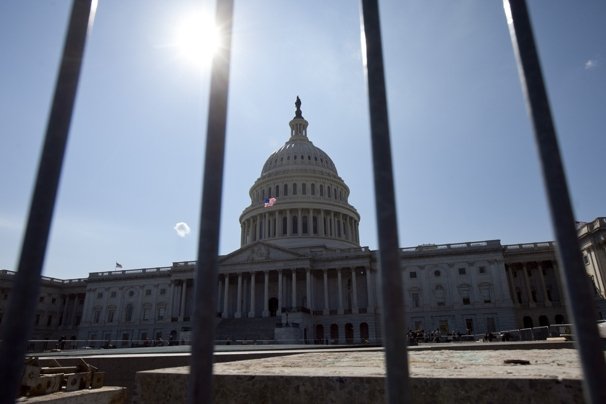
The US government shutdown is looming as Democrat and Republican lawmakers remain unable to strike a deal on a new plan to continue funding its operation
As the Democrats and Republicans vie for political advantage with the shutdown approaching, on Monday Republican House Speaker John Boehner criticized the Democratic-led Senate for remaining in recess on Sunday after the House passed its version of a budget bill.
“The House has done its work,” he said.
“We passed a bill… The Senate decided not to work yesterday. My goodness, if there is such an emergency, where were they?”
Early on Sunday, the Republican-run House of Representatives passed an amended version of the Senate spending bill that removed funding from the healthcare law and repealed a $29 billion medical device tax.
US Senate Majority leader Harry Reid vowed that his Democrat-led chamber would reject the Republican bill.
“[On Monday], the Senate will do exactly what we said we would do and reject these measures,” said Adam Jentleson, a spokesman for Harry Reid.
“At that point, Republicans will be faced with the same choice they have always faced: put the Senate’s clean funding bill on the floor and let it pass with bipartisan votes, or force a Republican government shutdown.”
[youtube Vqg41HyL3hw]
Senate Majority leader Harry Reid has warned that his Democratic-led chamber will reject a House Republican bill to avert a government shutdown.
Early on Sunday, the Republican-led House of Representatives passed its amended version of the Senate bill, removing funding from President Barack Obama’s healthcare law.
There is now less than 48 hours to avert a shutdown, which will begin on Tuesday if no spending bill is passed.
The Senate is not due to meet again until Monday afternoon.
In a statement, Senator Harry Reid said that “after weeks of futile political games from Republicans, we are still at square one”.
Harry Reid added that Republican efforts to change the bill – that would delay the healthcare law for a year and repeal a tax on medical devices – were pointless.

Senate Majority leader Harry Reid has warned that his Democratic-led chamber will reject a House Republican bill to avert a government shutdown
Speaking for the president, White House spokesman Jay Carney said: “Any member of the Republican Party who votes for this bill is voting for a shutdown.”
The president, he said, would also veto the Republican bill.
However, House Republicans went ahead with the changes, ignoring the veto threat and passing the bill in a late-night session by 231 votes to 192.
The Senate is controlled by Barack Obama’s Democratic party, while the Republicans hold the majority in the House of Representatives.
“House and Senate like two locomotives barreling toward one another … in slow motion,” tweeted Republican Representative Scott Rigell.
The looming shutdown ,which would be the first in 17 years, is one of two fiscal crises facing the US government. On October 17, the US treasury department’s authority to borrow money to fund its debt obligations expires unless Congress approves a rise in the so-called debt ceiling.
On Friday, President Barack Obama urged House Republicans to pass the Senate’s stopgap budget bill and to extend the debt limit, and demanded they not threaten to “burn the house down because you haven’t gotten 100% of your way”.
Barack Obama said if the nation were to default on its debt, it would have a “profound destabilizing effect” on the world economy.
“Voting for the treasury to pay its bills is not a concession to me,” Barack Obama said.
“No-one gets to hurt our economy… just because there are a couple of laws [they] don’t like.”
[youtube g83_0_03n4w]
President Barack Obama has spoken by phone to Iran’s President Hassan Rouhani – the first such top-level conversation in more than 30 years.
Barack Obama spoke of a “unique opportunity” to make progress with Iran’s new leadership, amid a flurry of diplomacy over its nuclear programme.
Earlier, Hassan Rouhani said Iran was keen to reach a deal soon.
Hassan Rouhani also asserted that Iran did not seek a nuclear bomb, as Western powers have long suspected.
Describing meetings at the UN this week as a “first step”, he said he believed the nuclear issue could be settled “within the not too distant future”.
Hassan Rouhani said initial discussions had taken place in an environment that was “quite different” from the past.
On his arrival back in Tehran from the UN General Assembly forum in New York, Hassan Rouhani was met by a number of key political figures, as well as both supporters and opponents from the public.
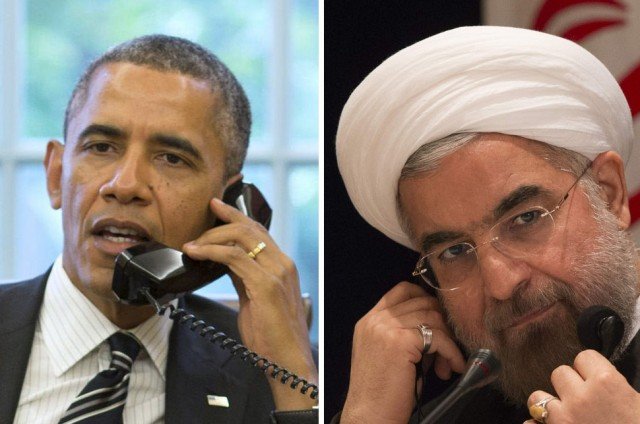
President Barack Obama in historic phone call with Iran’s President Hassan Rouhani
A New York Times reporter described the scene as chaotic, with dozens of hardliners hurling eggs and shoes at the president’s convoy.
The call with Barack Obama was made just before Hassan Rouhani left New York, where he has been attending the annual summit of the UN General Assembly, Iranian news agency Irna said.
White House officials described the 15 minute conversation – apparently initiated by Hassan Rouhani – as cordial.
Barack Obama raised concerns about American prisoners in Iran, but the bulk of the call was about efforts to reach a solution on the nuclear issue, she says.
Afterwards, Barack Obama said: “While there will surely be important obstacles to moving forward and success is by no means guaranteed, I believe we can reach a comprehensive solution.”
Hassan Rouhani, who is regarded as a moderate and was elected in June, has said he wants to reach a deal over the nuclear issue in three to six months.
The president says he is fully empowered by Iran’s Supreme Leader Ayatollah Ali Khamenei to negotiate.
On Friday, Hassan Rouhani told a press conference at the UN: “Whatever result we achieve through negotiations my government will have the full backing of all the main branches of power in Iran as well as the support of the people of Iran.”
Hassan Rouhani said he wanted a deal “within a very short period of time”.
[youtube plsc3ScCvak]
The UN has unanimously voted to adopt a binding resolution on ridding Syria of chemical weapons.
At a session in New York, the 15-member Security Council backed the draft document agreed earlier by Russia and the US.
The deal breaks a two-and-a-half year deadlock in the UN over Syria, where fighting between government forces and rebels rages on.
The vote came after the international chemical watchdog agreed on a plan to destroy Syria’s stockpile by mid-2014.
Speaking after the vote in New York, UN Secretary General Ban Ki-moon described the decision as “historic”.
“Tonight the international community has delivered.”
Ban Ki-moon urged the Syrian government to implement the resolution “faithfully and without delay”, and also announced a tentative date of mid-November for a new peace conference in Geneva.
US Secretary of State John Kerry said the UN demonstrated that “diplomacy can be so powerful that it can peacefully defuse the worst weapons of war”.
John Kerry said the resolution would for the first time seek to eliminate entirely a nation’s chemical weapons capability.
Russian Foreign Minister Sergei Lavrov also hailed the move, saying Moscow “war ready to take part in all operations” in Syria.
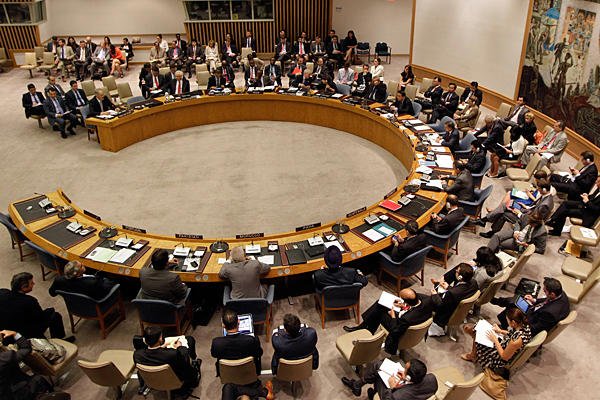
The UN has unanimously voted to adopt a binding resolution on ridding Syria of chemical weapons
However, he stressed that the success of international efforts was “not only on Damascus’ shoulders” and that Syrian opposition must co-operate.
The UN resolution condemns the use of chemical weapons but does not attribute blame.
The text has two legally binding demands: that Syria abandons its weapons stockpile and that the chemical weapons experts be given unfettered access.
Although the draft refers to Chapter VII of the UN Charter, which allows the use of military force, a second resolution authorizing such a move would be needed.
President Barack Obama earlier said agreement on the issue by council members would be a “potentially huge victory for the international community”.
Previous attempts at a resolution stumbled amid disagreements between Russia and the US on how to deal with the crisis in Syria.
The US – backed by France and the UK – had pushed for a resolution carrying the threat of military action against Syrian President Bashar al-Assad’s armed forces. Russia had opposed this.
Reacting to the vote, Syria’s UN Ambassador Bashar Jaafari said the resolution covered most of Damascus’ concerns.
But he stressed that countries supporting Syrian rebels should also abide by the adopted document.
The UN vote came just hours after the Organization for the Prohibition of Chemical Weapons (OPCW) adopted what it called “a historic decision on the destruction of Syria’s chemical weapons”.
In a statement after a late-night meeting in The Hague, the watchdog said its executive council “agreed on an accelerated programme for achieving the complete elimination of Syria’s chemical weapons by mid-2014. The decision requires inspections in Syria to commence from 1 October 2013”.
“The decision also calls for ambitious milestones for destruction which will be set by the (executive) council by 15 November.”
OPCW Director General Ahmet Uzumcu said the move “sends an unmistakable message that the international community is coming together to work for peace in Syria”.
[youtube Zt-h2MQ3SGg]
The US government careens toward a potentially devastating shutdown as Republicans and Democrats in Congress remain deadlocked on a budget to continue its funding.
Agencies have begun making contingency plans ahead of the October 1st deadline to pass a new funding resolution.
The Senate has passed a bill to fund the government through November 15.
But House Republicans have said they refuse to approve the bill absent a provision to strip funding from President Barack Obama’s health law.
The Senate is controlled by Barack Obama’s Democratic party, while the Republicans hold the majority in the House of Representatives.
As a result, lawmakers are at a stalemate as the deadline approaches.
Government agencies have been selecting workers considered essential should funds stop flowing.
The looming shutdown is one of two fiscal crises facing the US government. On October 17, the US treasury department’s authority to borrow money to fund its debt obligations expires unless Congress approves a rise in the so-called debt ceiling.
On Friday afternoon, President Barack Obama urged House Republicans to pass the Senate’s stopgap budget bill and to extend the debt limit, and demanded they not threaten to “burn the house down because you haven’t gotten 100% of your way”.

President Barack Obama urged House Republicans to pass the Senate’s stopgap budget bill and to extend the debt limit
Barack Obama said if the nation were to default on its debt, it would have a “profound destabilizing effect” on the world economy.
“Voting for the treasury to pay its bills is not a concession to me,” he said.
“No-one gets to hurt our economy… just because there are a couple of laws [they] don’t like.”
The president described the healthcare law as “a done deal” and said the Republican-backed repeal effort was “not going to happen”.
Barack Obama said the Senate had “acted responsibly” in passing the budget measure and that now it was up to Republicans in the House of Representatives “to do the same”.
If the government does shut down on October 1st, as many as a third of its 2.1 million employees are expected to stop work – with no guarantee of back pay once the deadlock is resolved.
National parks and the Smithsonian museums in the nation’s capital would close, pension and veterans’ benefit cheques would be delayed, and visa and passport applications would be stymied.
Programmes deemed essential, such as air traffic control and food inspections, would continue.
The defense department has advised employees that uniformed members of the military will continue on “normal duty status”, but “large numbers” of civilian workers will be told to stay home.
Last week, the US House of Representatives a bill that would maintain the US government’s funding levels through November 15 but strip funding from Barack Obama’s health law, known as Obamacare.
On Friday the Senate passed a version of the bill with the defunding provision removed 54-44, largely on party lines.
“The Senate has acted and we’ve done it with bipartisan co-operation. We’ve passed the only bill that can avert a government shutdown Monday night,” Democratic Senate leader Harry Reid said.
“This is it, time is gone.”
The House is now expected to take up that bill at the weekend. Unless the two chambers can come to a consensus and pass a bill for Barack Obama to sign, the federal government will close on October 1st.
[youtube L81WGdj6_yo]
Iran has been urged by China and the US to respond “positively” to an international offer over its nuclear programme, US officials say.
The call came ahead a rare, high-level meeting between the US and Iran.
Iranian President Hassan Rouhani called for a world without nuclear weapons, hours after saying Tehran wanted a deal in three to six months.
The West suspects Tehran is trying to develop a nuclear weapon, a claim strongly denied by Iran.
Iran has been negotiating over the issue since 2006 with the P5+1 – the five permanent members of the UN Security Council, plus Germany.
On Tuesday, Hassan Rouhani told the UN General Assembly that he was prepared to engage in “time-bound and results-oriented” talks.
On Thursday, Hassan Rouhani called from stricter controls on nuclear weapons as part of a global effort to eventually rid the world of them.
“No nation should possess nuclear weapons; since there are no right hands for these wrong weapons,” he said, speaking on behalf of the Non-Aligned Movement at the General Assembly.
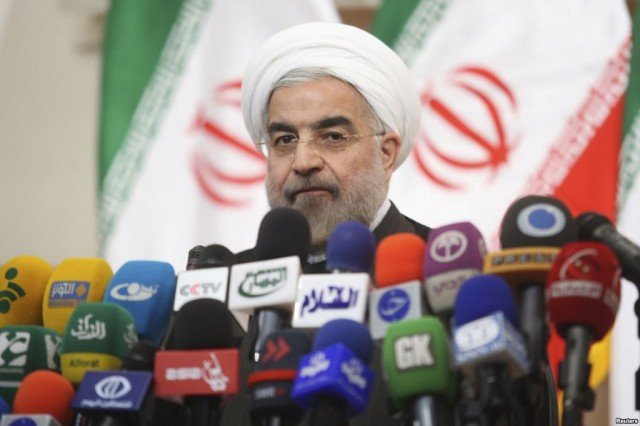
Hassan Rouhani called from stricter controls on nuclear weapons as part of a global effort to eventually rid the world of the
The P5+1 has asked to halt production and stockpiling of uranium enriched to 20% – a step away from achieving a nuclear weapons capability.
It also demanded Iran shut down the Fordo underground enrichment facility.
In return, it offered to ease the sanctions that have severely affected Iran’s economy.
“Both the US and China believe that Iran should cooperate with the P5+1 and should respond positively to the proposals that are on the table,” a US official told journalists at the UN.
Later, Foreign Minister Mohammad Javad Zarif is due to meet US Secretary of State John Kerry as well as diplomats from the UK, France, Russia, China and Germany on the sidelines of the annual UN General Assembly summit in New York.
It will be the highest level direct contact between the US and Iran for six years.
President Barack Obama has welcomed the new Iranian president’s more “moderate course”.
Barack Obama told the UN on Tuesday that the US wanted to resolve the nuclear issue peacefully, but was determined to prevent Iran from developing a nuclear weapon.
Hassan Rouhani has said he is fully empowered by Iran’s Supreme Leader Ayatollah Khamenei to negotiate on the issue.
[youtube KOmD8C6UiNU]
Treasury Secretary Jack Lew has warned that he US will hit its debt ceiling by October 17, leaving the government with half the money needed to pay its bills.
Jack Lew said that unless the US is allowed to extend its borrowing limit, the country will be left with about $30 billion to meet its commitments.
“Net expenditures on certain days can be as high as $60 billion,” he said.
The US government and Republicans are at stalemate over extending the credit limit needed to avoid default.
President Barack Obama and the Democrats have said they will not negotiate with Republicans over their demand that the government agrees budget cuts in return for backing a rise in the borrowing limit.
Jack Lew’s comments underline how close Washington is to running out of money. Failure to reach a deal would be “catastrophic” for the US economy, he said in a letter to House Speaker John Boehner.
“Treasury now estimates that extraordinary measures will be exhausted no later than October 17. We estimate that, at that point, Treasury would have only approximately $30 billion to meet our country’s commitments.
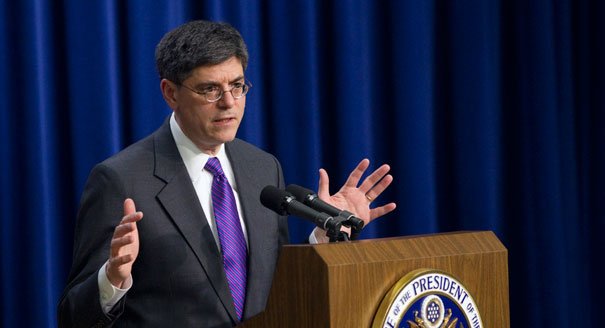
Jack Lew said that unless the US is allowed to extend its borrowing limit, the country will be left with about $30 billion to meet its commitments
“If we have insufficient cash on hand, it would be impossible for the United States of America to meet all of its obligations for the first time in our history,” Jack Lew said.
Jack Lew urged Congress to “act immediately” and increase the borrowing ceiling, which has been limited at $16.7 trillion since May.
In return for supporting a rise in the ceiling, Republicans are pushing for a series of measures, including a delay by a year in the introduction of the Affordable Care Act, which would increase benefits under Barack Obama’s Medicare health programme.
A spokesman for John Boehner said Jack Lew’s letter was a reminder of the need for an agreement to raise the ceiling while at the same time cutting US debt.
But he added: “And it should remind President Obama that refusing to negotiate with Congress on solutions just isn’t an option.”
Washington faced a similar impasse over its debt ceiling in 2011. Republicans and the Democrats only reached a compromise on the day the government’s ability to borrow money were due to run out.
In his letter, Jack Lew reminded Congress that the 2011 battle “caused significant harm to the economy”.
That fight was resolved just hours before the country could have defaulted on its debt, but nevertheless led to ratings agency Standard & Poor’s downgrading the US for the first time ever.
The 2011 compromise included a series of automatic budget cuts known as the “sequester” which came into affect earlier this year.
[youtube rpVM_fI_NdQ]
Presidents Barack Obama and Bill Clinton have joined forces to promote Obama’s healthcare initiative, known as Obamacare, just days before one of its major provisions takes effect.
In New York, they discussed the law’s progress and denounced Republican efforts to stymie its implementation.
Beginning on October 1st, Americans who lack health insurance will be able to buy policies in online market places.
Barack Obama said opponents were trying to “scare” people from signing up.
Even as conservative groups have undertaken a broad effort to undermine the law by persuading people to ignore it, Barack Obama said he was confident Americans would come to see its advantages.
“When people look and see that they can get high-quality, affordable healthcare for less than their cell phone bill, they’re going to sign up,” Barack Obama said.
The discussion, billed as an interview by Bill Clinton of Barack Obama took place on the sidelines of the UN General Assembly in New York.
It was part of the Clinton Global Initiative, a conference featuring Bill Clinton that he has held regularly since leaving the White House in 2001.
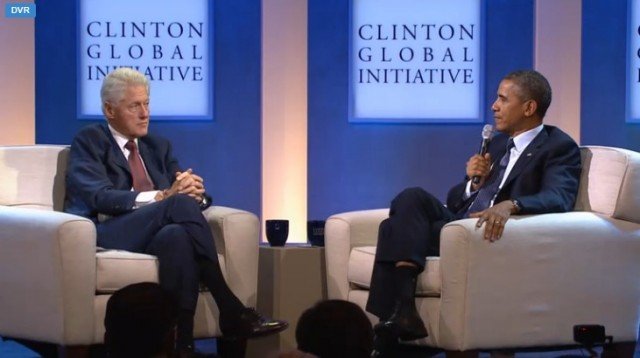
Presidents Barack Obama and Bill Clinton have joined forces to promote Obamacare
The Patient Protection and Affordable Care Act, which Barack Obama’s Democratic Party passed in 2010 in the face of unified Republican opposition, has been the centrepiece of Obama’s domestic policy agenda.
Its provisions include a requirement, which takes effect in January, that individuals who do not have health insurance provided by their employers purchase it on the open market.
On October 1st, online health insurance marketplaces run by the US federal government or by the states will begin accepting customers.
Opposition to the law, which is known to both sides of the debate as Obamacare, has become one of the central tenets of Republican and conservative politics, analysts say.
The House of Representatives, which is controlled by the Republican Party, has held dozens of votes on bills to repeal the law or strip it of funding. The bills have gone nowhere in the Democratic-controlled Senate.
The law has become a central point in the ongoing budget battle, with some Republicans pushing to shut down the operation of the US government by not passing a new budget if the Democrats refuse to defund the law.
On Friday, the House passed a bill that would prevent a government shutdown – but would strip the healthcare law of its funding. And on Tuesday, Republican Senator Ted Cruz of Texas undertook a marathon speech on the floor of the Senate to denounce the law and demand the government block its implementation.
“Those who have opposed the idea of universal healthcare in the first place and have fought this thing tooth and nail through Congress and through the courts and so forth have been trying to scare and discourage people from getting a good deal,” Barack Obama said.
On Monday, Bill Clinton asked Barack Obama why he had decided to tackle healthcare reform early in his first term, even as the economy was mired in one of the worst downturns since the Great Depression.
Barack Obama said healthcare was a “massive” part of the American economy, and noted the US was the only advanced industrialized nation that permitted “large numbers of its people to languish without health insurance”.
President Barack Obama also accused congressional Republicans of using the “pretty straightforward” issue as political capital as the government hurdles toward a shutdown on October 1st, when the law funding its operation expires.
[youtube dAjObSmGZAY]
President Barack Obama has said recent moves by Iran should offer the basis for a “meaningful agreement” on its nuclear programme.
Speaking at the UN General Assembly’s annual meeting, Barack Obama said words now had to be “matched by actions that are transparent and verifiable”.
The US leader recently exchanged letters with his newly-elected counterpart over the nuclear issue.
Barack Obama also called for a strong UN resolution on Syria’s chemical arms.
He said the purpose of such a resolution should be “to verify that the [Bashar al-Assad’s] regime is keeping its commitments” to remove or destroy its chemical weapons.
The deal for Syria to hand over its chemical weapons by mid-2014 was agreed earlier this month between the US and Russia, averting a possible Western military strike.
Differences have since emerged over whether the deal should be enforced by a UN Security Council resolution under Chapter VII of the organization’s charter, which would authorize sanctions and the use of force if Syria did not comply with its obligations.
Opening the UN summit on Tuesday, Secretary-General Ban Ki-moon said the Syrian government must “fully and quickly honor” its obligations under the deal.
“The international community must bring to justice the perpetrators of the use of chemical weapons in Syria, confirmed unequivocally by the UN investigation mission,” he said.
On Iran, Barack Obama said the US wanted to resolve the nuclear issue peacefully, but was determined to prevent Iran from developing a nuclear weapon.
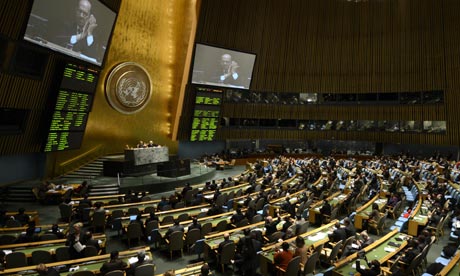
Speaking at the UN General Assembly’s annual meeting, Barack Obama urged for diplomatic push on Iran nuclear programme
“The roadblocks may prove to be too great, but I firmly believe the diplomatic path must be tested” he said, adding that he had urged his Secretary of State John Kerry to pursue a deal.
“Iran’s genuine commitment to go down a different path will be good for the region and the world,” Barack Obama said.
Iran insists it is a peaceful programme, but Western countries suspect it of seeking to develop a nuclear weapon.
Iran’s new President, Hassan Rouhani, has said he wants to present his country’s “true face”.
A meeting between Barack Obama and Hassan Rouhani – the first such encounter since the 1979 revolution – has not been ruled out.
There is also speculation that he and Barack Obama may shake hands on the sidelines of the General Assembly.
On Thursday, Iran’s Foreign Minister Mohammad Javad Zarif will discuss its nuclear programme with John Kerry and other diplomats.
A foreign ministry spokeswoman in Tehran said the meeting represented the “beginning for nuclear talks in the new era”.
The meeting will be attended by foreign ministers from the other four permanent UN Security Council members – the UK, China, France and Russia – and also Germany, which make up the so-called P5+1.
Hassan Rouhani has said he is ready to restart stalled nuclear talks without preconditions.
Western ministers will want to see an Iranian willingness to make concessions on its nuclear programme if there is to be any lifting or lightening of UN and Western sanctions.
Iran for its part will want a clear indication that the US is willing to treat Iran with the respect it believes it deserves as a significant regional player.
The EU’s foreign policy chief, Baroness Catherine Ashton, met Javad Zarif on Monday and described their discussion as “good and constructive.” She said her team would hold talks with Javad Zarif again in October in Geneva to assess progress.
Last week, Hassan Rouhani said that his country would never “seek weapons of mass destruction, including nuclear weapons”, and that his goal was “constructive engagement” with the international community.
President Barack Obama conquered a long-term smoking habit because he was afraid of his wife, he has joked with a UN official.
The jesting admission, which Barack Obama made apparently unaware he was on camera, came at the UN General Assembly in New York on Monday.
Barack Obama privately told a human rights campaigner that he had not had a cigarette in roughly six years.
“That’s because I’m scared of my wife,” the president said with a smile.
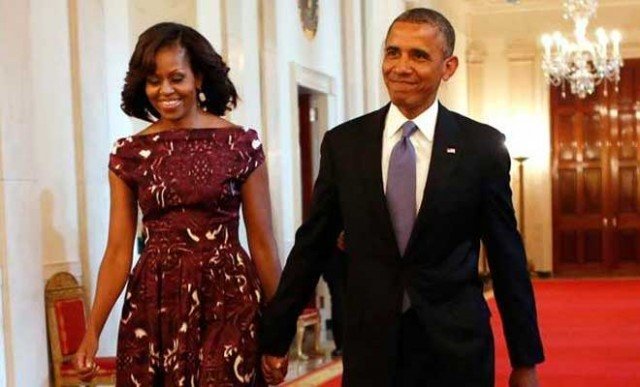
Barack Obama revealed he conquered a long-term smoking habit because he was afraid of his wife
The conversation between Barack Obama and Maina Kiai, the UN special rapporteur on the rights to freedom of peaceful assembly and of association, occurred near an open microphone and was later broadcast by CNN.
“I hope you’ve quit smoking,” Barack Obama said to Maina Kiai, a Kenyan.
“Sometimes,” Maina Kiai responded, as the two smiled and shook hands.
Both Barack Obama and Maina Kiai attended Harvard University Law School.
Barack Obama has publicly acknowledged his struggles to quit smoking in the past. In 2011, Michelle Obama said her husband had finally overcome the habit.
[youtube sT4PoO8VZwU]
Barack Obama has reiterated calls for changes to US gun laws at a memorial service for the victims of last week’s shooting at the Washington Navy Yard.
President Barack Obama said tears were “not enough”.
He told mourners Americans must insist that “there is nothing normal about innocent men and women being gunned down where they work”.
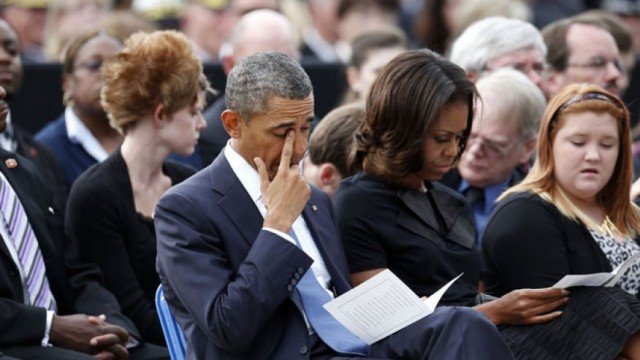
Barack Obama has reiterated calls for changes to US gun laws at a memorial service for the victims of last week’s shooting at the Washington Navy Yard
Twelve people were killed last Monday by contractor Aaron Alexis, who was himself shot dead by police.
Aaron Alexis, 34, reportedly had untreated mental health difficulties.
Barack Obama called on Americans to abandon their “creeping resignation” to mass shootings.
Acknowledging that “the politics are difficult” – a reference to his failure to get measures through Congress earlier this year – the president said change would not come from Washington.
“Change will come the only way it ever has come, and that’s from the American people,” Barack Obama told the crowd.
President Barack Obama and First Lady Michelle Obama met privately with victims’ relatives ahead of the shooting, the White House said.
[youtube sYIZiTY-sOA]
Russian politician Alexei Pushkov shocked America by mocking the Washington Navy Yard tragedy before a death toll had even been tallied.
Alexei Pushkov took to Twitter Monday morning and used Barack Obama’s words from a speech on the Syria crisis to ridicule Americans in the wake of the tragedy in Washington D.C.
“A new shootout at Navy headquarters in Washington – a lone gunman and 7 corpses. Nobody’s even surprised anymore,” Alexei Pushkov tweeted two hours after shots first rang out.
“A clear confirmation of American exceptionalism.”
As the New York Post points out, Alexei Pushkov, a member of the Russian parliament’s foreign affairs committee was likely referencing a comment made by the president last week.
“That’s what makes us exceptional,” Barack Obama said.
“With humility, but with resolve, let us never lose sight of that essential truth.”
Barack Obama was urging Americans to support a strike on Syria as a means of halting its human rights violations.
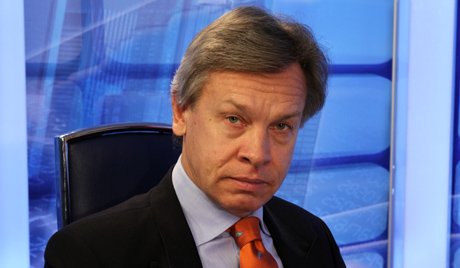
Alexei Pushkov shocked America by mocking the Washington Navy Yard tragedy before a death toll had even been tallied
But the Russian politician used the words to mock Americans
“The USA should part with the notion of American exceptionalism,” Alexei Pushkov tweeted about an hour later.
“It contradicts the principles of equal rights and smells of political racism.”
This is not Alexei Pushkov’s first swipe at America, nor is it his first foray onto the international stage, though his timing and methods leave him more wide open for criticism than ever before.
Alexei Pushkov, who is seen as especially close with the Kremlin, was among the most vocal in Russia during NSA leaker Edward Snowden’s prolonged stay at a Moscow airport.
Edward Snowden was eventually granted asylum in Russia, but not before Alexei Pushkov got in his jabs – at Snowden and America.
Alexei Pushkov at one point became annoyed with Edward Snowden’s prolonged citizenship limbo.
He joked that if Edward Snowden does not find shelter in Venezuela, “he will have to stay and marry Anna Chapman”, the redheaded Russian spy who was among 10 sleeper agents deported from the United States in 2010.
At another point in the saga, reports mistakenly suggested Edward Snowden has left Russia and the U.S. demanded to know his whereabouts.
“Why should the United States expect restraint and understanding from Russia,” Alexei Pushkov mocked at the time.
On Monday, Alexei Pushkov again showed no restraint when he used the occasion of a deadly shooting to make a political point.
The death count at the Washington Navy Yard continued to rise after the Parliamentarian’s comments. As of Monday afternoon, the death count was 12.
Gunman Aaron Alexis, who died after killing 12 people at a naval installation in Washington DC, has been identified as a former Navy serviceman.
Aaron Alexis, 34, of Fort Worth, Texas, died in a gun battle with police during the rampage at Washington Navy Yard.
Eight others were injured in the attack, which began at around 8:20 local time on Monday.
President Barack Obama ordered flags be lowered to half mast at the White House and on Capitol Hill.
He said he mourned “yet another mass shooting” and condemned the “cowardly act”.
No motive is known for the attack, whose dozen victims ranged in age from 46 to 73, said the authorities.
Police initially responded to reports of two other armed suspects, but after exhaustive searches Washington Police Chief Cathy Lanier said on Monday night they were all but certain that Aaron Alexis was the only gunman.
Witnesses said suspect Aaron Alexis sprayed bullets in a hallway and fired from a balcony down on to workers in an atrium at the heavily secured installation in the US capital.
Aaron Alexis was reportedly armed with an AR-15 semi-automatic rifle, a shotgun and a handgun that he took from a police officer at the scene.
Chief Cathy Lanier told reporters that the attacker “was engaged in shooting with police officers” when he died.

Aaron Alexis died in a gun battle with police during the rampage at Washington Navy Yard
“There is no question he would have kept shooting,” she added.
Valerie Parlave of the FBI said that the suspect, who was employed by a subcontractor that was working on a US Navy intranet network, had a valid pass to enter Washington Navy Yard.
Aaron Alexis was formerly a petty officer 3rd class who served full-time in the naval reserve from 2007-11, said the US Navy.
It was not immediately clear why he left the military, but unnamed military officers told US media there had been a series of misconduct issues during his service.
According to media reports, Aaron Alexis was a Buddhist convert who had had two previous gun-related brushes with the law.
In 2004 Aaron Alexis was arrested in Seattle for shooting a construction worker’s car tyres, in what he described as an enraged “black-out”.
And he was questioned by Fort Worth police in 2010 after firing his gun through the floor of an upstairs apartment. He said it was an accidental discharge.
In addition to those killed in Monday’s rampage, one police officer was shot in the legs, a female civilian was shot in the head and hand, and another woman was treated for a shoulder wound.
All three were expected to recover, said Washington Hospital Center officials.
Five others required medical treatment, mostly for minor injuries, said Washington DC Mayor Vincent Gray.
As news of the shooting emerged, emergency vehicles and police surrounded the complex, while helicopters hovered overhead.
The US Senate buildings and six nearby schools were temporarily placed on lockdown as a precaution, while flight departures were briefly suspended at Reagan National Airport.
Patricia Ward, who works at Washington Navy Yard, said she had heard three shots, a pause, and then four more.
“Everybody was panicking and trying to decide which way to get out,” she told reporters.
The Washington Nationals baseball team called off their game against the Atlanta Braves on Monday night at Nationals Park, not far from Navy Yard.
Monday’s mass shooting occurred at a building that serves as the headquarters for the Naval Sea Systems Command, which builds and maintains ships and submarines for the Navy.
Washington Navy Yard is the US Navy’s oldest shore installation, first opened in the early 19th Century, according to the Navy.
[youtube Q3vhGXQJ9bY]
Syrian President Bashar al-Assad has appeared on Russian TV to confirm that his country’s chemical weapons will be placed under international control.
Bashar al-Assad’s comments, to Rossiya 24, came as US and Russian foreign ministers prepared to meet in Geneva to discuss the plan, proposed by Russia earlier this week.
He insisted that the move was a result of the Russian initiative and not the threat of US military action.
The US accuses the Syrian regime of killing hundreds in a chemical attack.
Syrian government denies the allegation, blaming rebels for the attack in the Ghouta area of the capital, Damascus, on August 21.
Russia announced its proposal for dealing with the escalating chemical weapons crisis on Monday, as the US Congress was preparing to vote on whether to back President Barack Obama’s moves towards military action against Syria.
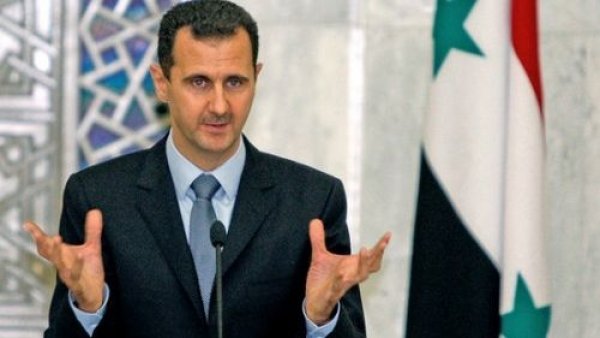
Bashar al-Assad has appeared on Russian TV to confirm that Syria’s chemical weapons will be placed under international control
On Thursday, Russian Foreign Minister Sergei Lavrov outlined three main phases of the proposal:
- Syria joins the Chemical Weapons Convention, which outlaws the production and use of the weapons
- Syria reveals where its chemical weapons are stored and gives details of its programme
- Experts decide on the specific measures to be taken
In his interview, which has not yet been broadcast in full, Bashar al-Assad told state-run Rossiya 24: “Syria is placing its chemical weapons under international control because of Russia. The US threats did not influence the decision.”
He confirmed that Syria would send relevant documents to the UN “in the next few days” as part of the process of signing the chemical weapons convention.
Bashar al-Assad said Syria would then submit information on its chemical weapons one month after signing.
He also said that Russia’s proposal was “not unilateral”, adding: “Syria will accept it if America stops military threats and if other countries supplying the rebels with chemical weapons also abide by the agreement.”
Bashar al-Assad said only Russia could make the agreement happen as “Syria has neither contacts with, nor trust in, America”.
Sergei Lavrov – who is scheduled to meet US Secretary of State John Kerry in Geneva on Thursday to discuss the plan – said during a visit to Kazakhstan: “I am sure that there is a chance for peace in Syria. We cannot let it slip away.”
He did not mention the destruction of the weapons, which was part of Moscow’s original proposal but is thought to be a sticking point in negotiations with Damascus.
Before meeting Sergei Lavrov, John Kerry is holding talks with UN-Arab League envoy to Syria, Lakhdar Brahimi.
[youtube f7kHr3LKJwo]
Vladimir Putin has made a direct personal appeal to the American people over the Syrian crisis.
In an opinion article in the New York Times, Vladimir Putin warns that a US military strike against Syria could unleash a new wave of terrorism.
The Russian president says millions of people see the US not as a model of democracy but as relying on brute force.
The US and Russia are due to hold talks in Geneva later over Syria’s chemical weapons arsenal.
Moscow, an ally of Syrian President Bashar al-Assad, has proposed putting the weapons under international control before destroying them.
Damascus has agreed, at least partially, to the proposal, and President Barack Obama to put military action against Syria on hold.
The US blames the Syrian government for a chemical weapons attack near Damascus last month that killed hundreds. Syria blames the attack on rebels.
As the diplomatic efforts continue, the Syrian army has been trying to retake the Christian town of Maaloula which was overrun by rebel forces – including members of the al-Qaeda-linked al-Nusra Front – at the weekend.
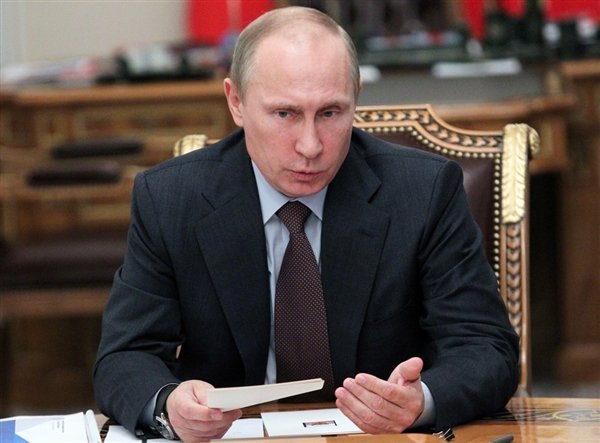
Vladimir Putin has made a direct personal appeal to the American people over the Syrian crisis
In the New York Times article, Vladimir Putin says recent events “have prompted me to speak directly to the American people and their political leaders”.
He warned that the UN could suffer the same fate as its precursor, the League of Nations, if “influential countries bypass the United Nations and take military action without Security Council authorization”.
“The potential strike by the United States against Syria, despite strong opposition from many countries and major political and religious leaders, including the Pope, will result in more innocent victims and escalation, potentially spreading the conflict far beyond Syria’s borders,” Vladimir Putin says.
“A strike would increase violence and unleash a new wave of terrorism. It could undermine multilateral efforts to resolve the Iranian nuclear problem and the Israeli-Palestinian conflict and further destabilize the Middle East and North Africa. It could throw the entire system of international law and order out of balance.”
Vladimir Putin said Russia was not protecting the Syrian government “but international law”.
He reiterated Russia’s opinion that the gas attack of August 21 was probably carried out by opposition forces “to provoke intervention by their powerful foreign patrons”.
“Reports that militants are preparing another attack – this time against Israel – cannot be ignored,” he adds.
“It is alarming that military intervention in internal conflicts in foreign countries has become commonplace for the United States. Is it in America’s long-term interest? I doubt it. Millions around the world increasingly see America not as a model of democracy but as relying solely on brute force.”
The article comes as US Secretary of State John Kerry prepares to meet his Russian counterpart Sergei Lavrov in Geneva to discuss Moscow’s proposal.
[youtube ssojHgdDrnI]
 Prev1...141516...31Next
Prev1...141516...31Next  Page 15 of 31
Page 15 of 31

























